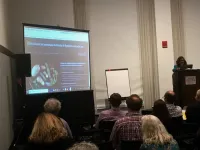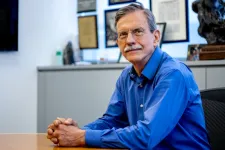(Press-News.org) NEWPORT NEWS, VA – A teenage fascination with metals has led to a prestigious early-career award for a superconducting radiofrequency (SRF) materials scientist at the U.S. Department of Energy’s Thomas Jefferson National Accelerator Facility.
Shreyas Balachandran has been chosen to receive the ICMC Cryogenic Materials Award for Excellence, presented annually to an individual under 40 who has demonstrated innovation, impact and international recognition for their work in advancing the knowledge of cryogenic materials.
“It’s good to be recognized for what you do, but it’s a testament to people who believed in you and gave you a chance,” Balachandran said. “I’ve had excellent mentors throughout my whole journey. And I see this award as a recognition to everyone who’s been involved in all of the work that I’ve done.”
Balachandran’s research focuses heavily on niobium, which among other applications is used to make superconducting cavities for particle beam accelerators, including Jefferson Lab’s powerful Continuous Electron Beam Accelerator Facility, or CEBAF. CEBAF is a DOE Office of Science user facility that is the research home to more than 1,850 nuclear physicists worldwide.
Niobium cavities make up the backbone of an accelerator. They’re housed in a string of cryomodules and supercooled by liquid helium to about 2 Kelvin, or -456 Fahrenheit, to quash normal resistance and accelerate electrons as they pass through to near light-speed, delivering beams for experiments.
Niobium is critical for particle accelerators for scientific research and in materials discovery, medical treatment and environmental remediation. Scientists and engineers are constantly working to fine-tune the metal’s performance by improving its processing or combining it with other elements, such as titanium, nitrogen, tin and aluminum to create more efficient, durable and superconducting alloys and structures.
Balachandran’s work includes developing a new niobium-tantalum-hafnium alloy with applications for next-generation superconducting wires. He’s currently experimenting with Nb3Sn, a niobium-tin compound that superconducts at a higher temperature than pure niobium, which would eliminate the need for massive and expensive cryoplants and could become a game-changer one day in high-energy accelerators. While Nb3 Sn is more brittle than niobium, it could eliminate the need for large and expensive cryogenic refrigeration facilities for cooling the particle accelerator cavities. That would make it a game-changer for high-energy particle accelerators.
A detective in metallurgy
Balachandran was born and raised in Bangalore in southern India. His interest in metals was piqued during a high school competition, leading to his devouring college-level books on metallurgy. It continued as he pursued his bachelor’s degree in mechanical engineering at the R.V. College of Engineering in India and at Texas A&M University in College Station, where he earned his master’s and doctorate. His doctoral thesis was on “Microstructure Development in Bulk Niobium Following Severe Plastic Deformation and Annealing.”
With an accelerator stewardship grant from DOE, he conducted postdoctoral work at the Applied Superconductivity Center at the National High Magnetic Field Laboratory (MagLab) at Florida State University in Tallahassee from 2015 to 2018. His research included material development of high-purity niobium for superconducting SRF applications for linear accelerators.
From 2018-2022, Balachandran joined MagLab’s visiting research faculty. There, he developed the niobium-tantalum-hafnium alloy, which could be made into durable fine wires for high-powered research magnets capable of carrying about 1500 amps per millimeter squared (at 4 Kelvin, 16 Tesla). This is vastly superior to copper, considered an excellent conductor of electricity, rated at 1-5 amps per millimeter squared. The alloy is now commercially available in the U.S. and Japan.
Balachandran and his colleagues also conducted an autopsy of failures caused by magnet assembly during the high-luminosity Large Hadron Collider upgrade at CERN in Switzerland. After independently verifying the cause of the conductor failures — and hence the magnet failures — CERN continued its upgrade.
“I’m easily drawn towards figuring out why something is happening,” Balachandran said. ”We’re almost like a detective trying to figure out why materials do what they do.”
Balachandran has been collaborating with Jefferson Lab since 2015 to improve the performance of niobium. He was brought on board as a materials scientist in 2022 to advance research and development of more efficient superconducting cavities for CEBAF through new processing techniques, coatings or materials.
Cavities made of niobium-tin, for instance, could perform as well as those made of niobium, but at 4 Kelvin rather than 2 Kelvin. This difference would require far less floor space using a cryocooler to reach superconducting temperatures rather than a massive cryoplant housed in a multistory building.
“You basically can shrink the whole system to a manageable size,” Balachandran said. “So you can have smaller, efficient machines producing beams at the same energy. That’s the direction that this whole technology is going towards. And there is much exciting work ahead of us to get there,” he said.
The ICMC Cryogenic Materials Award for Excellence will be presented July 11 at the group’s annual conference in Honolulu, Hawaii. It comes with a cash award and an invitation for Balachandran to give a presentation about his research.
By Tamara Dietrich
-end-
Jefferson Science Associates, LLC, manages and operates the Thomas Jefferson National Accelerator Facility, or Jefferson Lab, for the U.S. Department of Energy's Office of Science. JSA is a wholly owned subsidiary of the Southeastern Universities Research Association, Inc. (SURA).
DOE’s Office of Science is the single largest supporter of basic research in the physical sciences in the United States and is working to address some of the most pressing challenges of our time. For more information, visit https://energy.gov/science.
END
SAN ANTONIO — May 24, 2023 —Dr. Peter Lee of Southwest Research Institute’s Tribology Research and Evaluations Section has been named a Fellow of the Society of Tribologists and Lubrication Engineers (STLE).
An STLE fellowship recognizes society members with significant contributions over 20 years of active practice in the field of tribology and lubrication engineering. These contributions must meet a standard considered by STLE above and beyond those typically expected of a scientist or engineer. Tribology is the study of lubrication, friction ...
Known as the “plant destroyer,” the genus Phytophthora is considered one of the most important groups of plant pathogens—causing significant economic and environmental losses throughout history and into today. There are over 200 identified species in the Phytophthora genus. These pathogens, and those yet to be identified, can spread quickly due to the increasing rate of global trade, e-commerce, and travel. Rapid identification is therefore critical for effective plant disease management.
While several international online resources for Phytophthora identification ...
Researchers describe the “generic Air-gen effect”—nearly any material can be engineered with nanopores to harvest, cost effective, scalable, interruption-free electricity
AMHERST, Mass. – A team of engineers at the University of Massachusetts Amherst has recently shown that nearly any material can be turned into a device that continuously harvests electricity from humidity in the air. The secret lies in being able to pepper the material with nanopores less than 100 nanometers in diameter. The research appeared in the journal Advanced Materials.
“This is very exciting,” ...
Recent technological advances have given us a remarkable ability to manipulate and control light waves, opening up numerous applications in various fields, such as optical communication, sensing, imaging, energy, and quantum computing. At the heart of this progress are photonic structures that can control light waves, either at the chip level in the form of photonic integrated circuits (PICs) or in free space as meta-optics. Combining these structures allows for the creation of compact optical systems. The PICs can be used to make subtle changes to the light wave, ...
BOSTON, March 29, 2023 — The Institute for Protein Innovation (IPI), a nonprofit research organization, announced today a $210 million gift from Tim Springer, Ph.D., veteran entrepreneur and professor at Harvard Medical School and Boston Children’s Hospital, who founded IPI in 2017 with Andrew Kruse, Ph.D. The gift will advance protein science and accelerate research to improve human health.
The philanthropic gift—made by Springer, his wife Chafen Lu, Ph.D., and their children—adds ...
DALLAS – Texas scientists will receive $2.5 million in funding to advance their research thanks to a new prize program from Lyda Hill Philanthropies and TAMEST (Texas Academy of Medicine, Engineering, Science and Technology). The Hill Prizes, funded by Lyda Hill Philanthropies, will accelerate high-risk, high-reward research ideas with significant potential for real-world impact.
The Prizes will celebrate top Texas innovators and researchers whose work could significantly impact science and society in five categories: Medicine, Engineering, Biological Sciences, Physical Sciences ...
Berlin and Washington DC, May 24, 2023 – Morressier announced today an integrity suite that will be offered as part of its end-to-end platform, designed to increase the quality of and trust in the outputs of scientific research.
Pre-flight checks for authors will flag potential quality issues, check for completeness of submissions, and provide recommendations for improvements in areas such as language.
Publishers using the Morressier platform now have access to a powerful suite of automated tools to help them identify integrity issues early and at scale. Plagiarism detection tools in the Morressier platform, for instance, indicate phrases in submissions that may ...
SEngine Precision Medicine, the precision oncology innovator matching patients to medicines based on their own tumor samples, announces the publication of a new case report showing a patient’s remarkable response to an off-label therapy identified by its PARIS® Test. Despite standard-of-care chemotherapy and two surgeries, the patient’s low-grade serous ovarian cancer (LGSOC) was progressing and her prognosis was terminal. But by testing a range of therapies in organoids grown from the patient’s own tumor sample, SEngine’s PARIS® Test identified as ...
Far more older adults these days log on to secure websites or apps to connect with their health information or have a virtual health care appointment, compared with five years ago, a new poll shows.
Overall, 78% of people aged 50 to 80 have used at least one patient portal, up from 51% in a poll taken five years ago, according to findings from the University of Michigan National Poll on Healthy Aging. Of those with portal access, 55% had used it in the past month, and 49% have accounts on more than one portal.
But the poll also reveals major disparities, with some groups of older adults less likely to use patient portals, or more likely ...
A Michigan Medicine-led study finds that stressors across the lifespan — including poverty, abuse and divorce — are associated with worsening health and functional outcomes for people with multiple sclerosis.
Using survey data from more than 700 people with MS, researchers discovered that stressful events occurring both in childhood and adulthood contributed significantly to participants’ level of disability.
The results are published in Brain and Behavior.
“MS is the leading cause of non-traumatic ...






